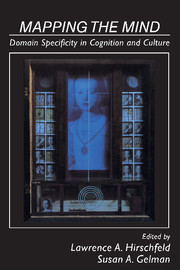Book contents
- Frontmatter
- Contents
- List of contributors
- Preface
- Part I Overview
- Part II The origins of domain knowledge: Biology and evolution
- Part III The origins of domain knowledge: Conceptual approaches
- Part IV Are domains theories?
- Part V Domains across cultures and languages
- 14 First principles can support both universal and culture-specific learning about number and music
- 15 Cognitive constraints on cultural representations: Natural ontologies and religious ideas
- 16 Universal and culture-specific properties of children's mental models of the earth
- 17 Cognitive domains and the structure of the lexicon: The case of the emotions
- Part VI Implications for education
- Author index
- Subject index
14 - First principles can support both universal and culture-specific learning about number and music
Published online by Cambridge University Press: 04 August 2010
- Frontmatter
- Contents
- List of contributors
- Preface
- Part I Overview
- Part II The origins of domain knowledge: Biology and evolution
- Part III The origins of domain knowledge: Conceptual approaches
- Part IV Are domains theories?
- Part V Domains across cultures and languages
- 14 First principles can support both universal and culture-specific learning about number and music
- 15 Cognitive constraints on cultural representations: Natural ontologies and religious ideas
- 16 Universal and culture-specific properties of children's mental models of the earth
- 17 Cognitive domains and the structure of the lexicon: The case of the emotions
- Part VI Implications for education
- Author index
- Subject index
Summary
There is a growing body of evidence that infants attend selectively to some fundamental aspects of number and music. Such findings suggest that attention to and learning about number and music are perhaps due to the presence of innate, skeletal principles in each domain. In our chapter, we develop this position while showing how it is consistent with the different ways that cultures support learning and development in specific knowledge areas. Pairing considerations of number and music enables us to show that domain specificity and cultural variation need not be treated as antithetical.
Whereas it is still common for scholars in some fields to assume that “primitive” peoples lack a concept of number (see the following discussion), there is wide acceptance of the idea that all peoples develop musical competence, mainly because the latter can happen without benefit of formal instruction, use of special symbol systems, or the need to represent abstract, relevant dimensions like pitch, key, harmony, rhythm, and so forth. Indeed, accounts of the evolutionary function of the human music capacity often include the idea that, in preliterate societies, music serves to efficiently organize information that cannot be written down. For example, Gardner (1983) describes a possible role for music in organizing religious rites and work groups in the Stone Age, and Sloboda (1985) hypothesizes that music provides a mnemonic framework within which the structure of cultural knowledge and societal relations is stored and communicated. Whatever the role of music in preliterate groups, Donald (1991) points out that these societies always have complex rituals based on some form of music.
Information
- Type
- Chapter
- Information
- Mapping the MindDomain Specificity in Cognition and Culture, pp. 369 - 390Publisher: Cambridge University PressPrint publication year: 1994
Accessibility standard: Unknown
Why this information is here
This section outlines the accessibility features of this content - including support for screen readers, full keyboard navigation and high-contrast display options. This may not be relevant for you.Accessibility Information
- 19
- Cited by
